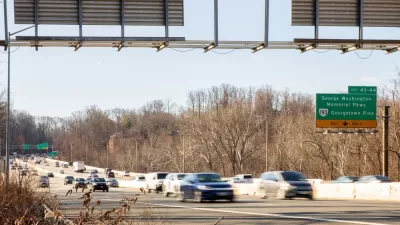Americans are driving more, again. Streetsblog dares to challenges the Federal Highway Administration on whether that's data worth celebrating.
"This June, Americans drove 8.7 billion more miles than last June, according to [the Federal Highway Administration], a 3.5 percent increase. Total mileage in 2015 is on pace for a new high — finally 'beating the previous record' of 1.5 trillion vehicle miles set 2007," according to an article by Angie Schmitt.
Schmitt's coverage reacts with some shock to the barely contained "glee" implied in the FHWA's reporting of the statistics via press release on August 20. Schmitt's opinion on what the trend of increased driving really means: "more traffic overwhelming city streets, slowing down buses, and spewing pollutants into the air."
Schmitt's concern, however, is that the FHWA’s press release reads like "the explicit goal of American transportation policy is simply to double traffic mileage again by 2050." That assumption, precedes an appeal for "increased transportation investment" in the press release.
So the question is: How should the FHWA, and other federal transportation agencies, frame the news that Americans are driving more and farther than ever before?
FULL STORY: FHWA Gleefully Reports That Driving Is Rising Again

Planetizen Federal Action Tracker
A weekly monitor of how Trump’s orders and actions are impacting planners and planning in America.

Maui's Vacation Rental Debate Turns Ugly
Verbal attacks, misinformation campaigns and fistfights plague a high-stakes debate to convert thousands of vacation rentals into long-term housing.

San Francisco Suspends Traffic Calming Amidst Record Deaths
Citing “a challenging fiscal landscape,” the city will cease the program on the heels of 42 traffic deaths, including 24 pedestrians.

Amtrak Rolls Out New Orleans to Alabama “Mardi Gras” Train
The new service will operate morning and evening departures between Mobile and New Orleans.

The Subversive Car-Free Guide to Trump's Great American Road Trip
Car-free ways to access Chicagoland’s best tourist attractions.

San Antonio and Austin are Fusing Into one Massive Megaregion
The region spanning the two central Texas cities is growing fast, posing challenges for local infrastructure and water supplies.
Urban Design for Planners 1: Software Tools
This six-course series explores essential urban design concepts using open source software and equips planners with the tools they need to participate fully in the urban design process.
Planning for Universal Design
Learn the tools for implementing Universal Design in planning regulations.
Heyer Gruel & Associates PA
JM Goldson LLC
Custer County Colorado
City of Camden Redevelopment Agency
City of Astoria
Transportation Research & Education Center (TREC) at Portland State University
Jefferson Parish Government
Camden Redevelopment Agency
City of Claremont





























